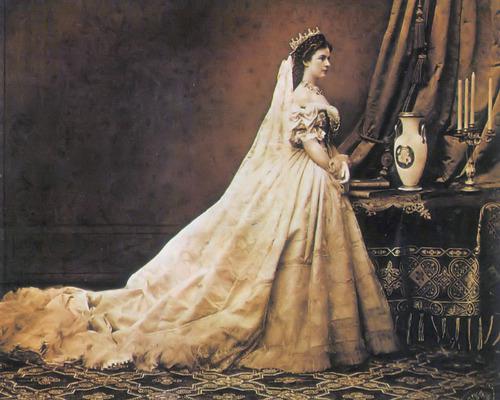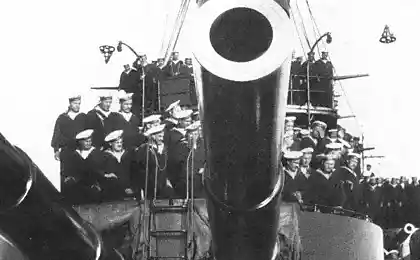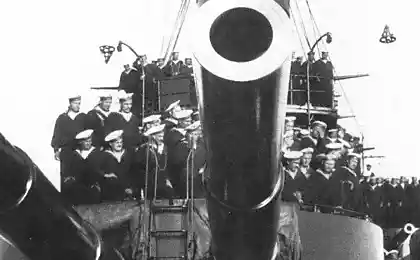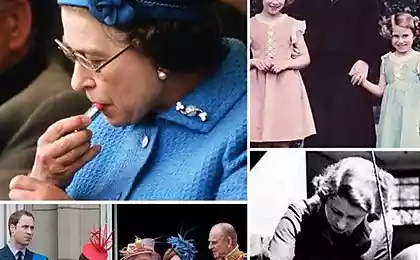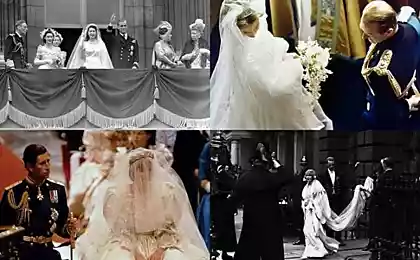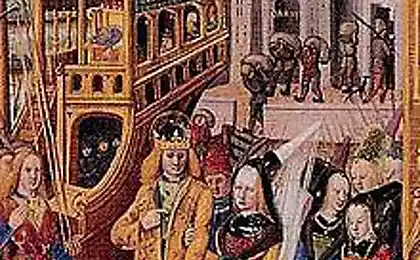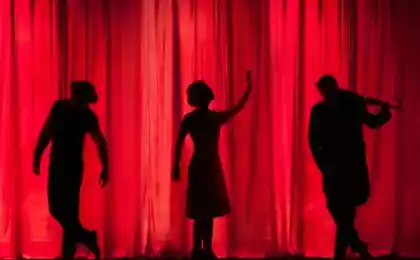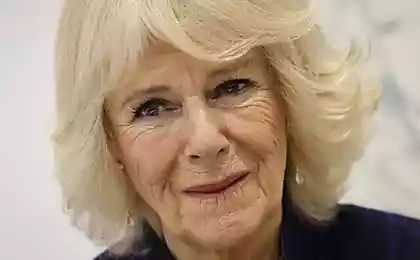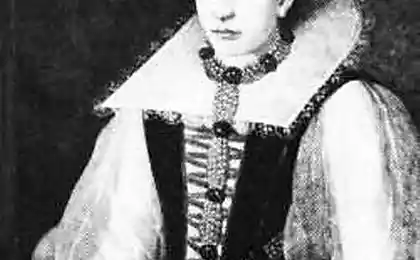7324
Empress Sisi - Elisabeth of Bavaria, 1854
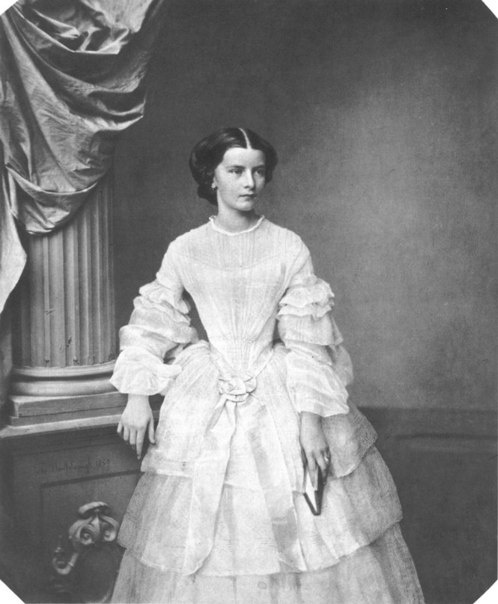
Elizabeth (full name Amalia Eugenia Elizabeth it. Amalia Eugenia Elisabeth; December 24, 1837 - September 10, 1898) - the wife of Emperor Franz Joseph I, by birth Princess of Bavaria. Empress of Austria from April 24, 1854 (date of marriage), Queen Consort of Hungary May 8, 1867 (date of formation of the dual monarchy of Austria-Hungary). In Austria (and later - and the world) is known as diminutive name Sisi (it. Sissi), who called her family and friends (in fiction and film used spelling Sissi) ...
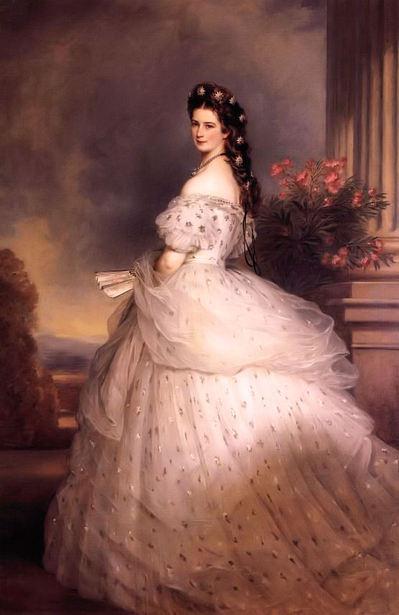
Biography
Childhood and adolescence
Sisi was born December 24, 1837 in the family of Wittelsbach in Munich estate Bavarian Duke Maximilian. She was born on Christmas Eve on Sunday, and at the same with one tooth in the mouth, like Napoleon, which according to legend is a happy life. Godmother girl became Queen Elizabeth of Prussia, whose name and give the future Empress.
Sisi childhood took place in Munich in the summer estate of her family Possenhofen, where the young Duchess was a personal menagerie. Of all the children of Duke Maximilian close relationships have developed Sisi only the most educated and obedient elder sister Helena. In 1846, a new teacher Princess Louise Wulff brings her younger brother Karl Theodor, nicknamed Chicken family because he believes that Nene (the name Helena in the family) has too much influence on the more fragile sister. By Sisi indifferent music, it attracts painting: she gladly paints landscapes and illustrates the events in his diary ...
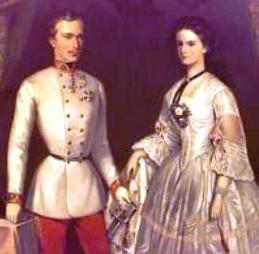
Betrothal and marriage to Franz Joseph
Wedding Emperor of Austria-Hungary Franz Joseph and Helena was discussed in advance. Helena begin to prepare for marriage: export out and teach riding. Loving Animals Sisi entreats parents to allow her to join her sister and because of their fearlessness quickly surpass it in achievements than discourages from Helena to continue lessons.
Engagement Helena and Franz timed to 23 th anniversary of the emperor, for it to enter into the Duchess Louis with two older daughters and the imperial family went to Innsbruck. Franz saw my cousins before, but then, being sixteen, he was too passionate about his thoughts on the future of the board to pay attention to the cousins, the eldest of whom had just turned thirteen, and the youngest was not eleven. Sisi - a girl, not very nicely, says the younger brother of Emperor Karl Ludwig. Between him and Elizabeth tied romantic correspondence, they exchange gifts, and parents do not prevent them from doing so.
The relationship between the bride and groom do not add up, and in love with Sisi Karl Ludwig first drew attention to the mother's sympathy for Elizabeth Franz. Although everything was not as it was planned initially, the mother of Emperor Archduchess Sophia reluctantly asks her sister Ludovica hand of his niece for France. It was a dynastic marriage, and the emperor had to marry any of the daughters 'right' family. Elizabeth was agreed.
April 24, 1854 Emperor Franz Joseph married with his sixteen-year-cousin. The wedding took place in the church of the Augustinian in Vienna. In silver embroidered pink dress with a diamond tiara on her head, Sisi went to Vienna in a carriage with wheels and gold inlaid doors, painted by Rubens more.
Shortly after the wedding, life at court became a burden Sisi. Archduchess Sophia sought to make his niece real empress and despotic control it. Introduced in Vienna etiquette court of Charles V is strictly regulated and court life, and the life of Elizabeth, a firm schedule Sisi deprived of all freedom. She tried to complain about her husband, but to no avail - the spouse was too much public concern. Franz Joseph, feels a deep respect for the mother and boundless love for his wife, was mild in nature and could not achieve reconciliation between the two ladies. Elizabeth was often left alone, write sad poems, read a lot, but her true passion was riding that gave the illusion of freedom.
Are not understood, Elizabeth turned in on itself. She did not like publicity and, of course, she could not like that from the day of the wedding in her apartment are strangers. Accustomed to freedom Sisi neglected manage life court etiquette, from mannerisms, reverence and greetings to the length gloves and depth of chest. Forced in accordance with its responsibilities Empress appear in public, she walked the fence suburban palace park in Laxenburg. From 1875 to 1914 the summer residence for the couple was Villa in Bad Ischl.
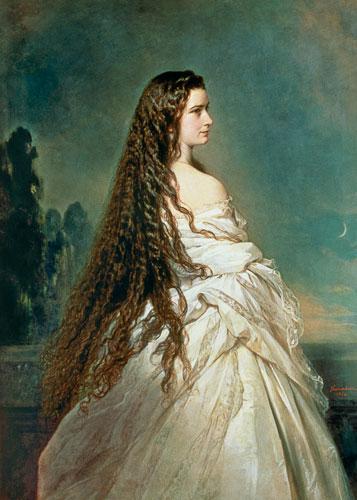
The birth of children
The situation deteriorated further when Elizabeth announced her pregnancy. Now Archduchess Sophia, who considered Sisi still too young (Empress was not yet eighteen), allowed herself to break into her room at any time and pestered expectant mother advice and reproaches. To the people saw that the Empress waits for the child, on the orders of Sophia fence was removed. The yard was hoping for the birth of an heir, but to everyone's dismay, March 5, 1855 at Sisi daughter. Unbeknownst to his mother, she was given the name Sofia and placed in apartments to Archduchess. The same thing happened after the birth July 15, 1856 the second daughter, Gisela. Sissy could see the children only in strictly designated for this watch. Only through the intervention of a spouse babies moved closer to the apartment of the mother. But soon the fate dealt a terrible blow to Elizabeth. Stay hungry children alone Sisi persuades Franz take them with you in Hungary where to send the imperial couple. During the trip the girls sick, Gisela quickly goes on the amendment, and a painful two-year Sofia dies in front of his mother. Elizabeth blames himself seriously worrying over the death of his daughter. But soon finds herself pregnant again Sisi and August 21, 1858 she gives birth to a long-awaited heir to the Austrian throne, Rudolf.
At first, the birth of the heir to all pleased, but soon the feud between the two women broke out with renewed vigor. Sisi slowly recovering after giving birth, and Sofia took advantage of this, is granted the right to monitor the education of Rudolph. Not having the strength to fight, the Empress agreed.
Meanwhile Franz Joseph went to the Italian front to fight the forces of Napoleon III in the Po Valley. He often wrote love letters Sisi. Wife worried about him and she kept extremely nervous life: eating little, every day a quarrel with her mother in law and tried to escape from their surroundings, making long walks or horse riding. To return to the emperor, his wife noticeably thinner, and her mind is greatly shattered.
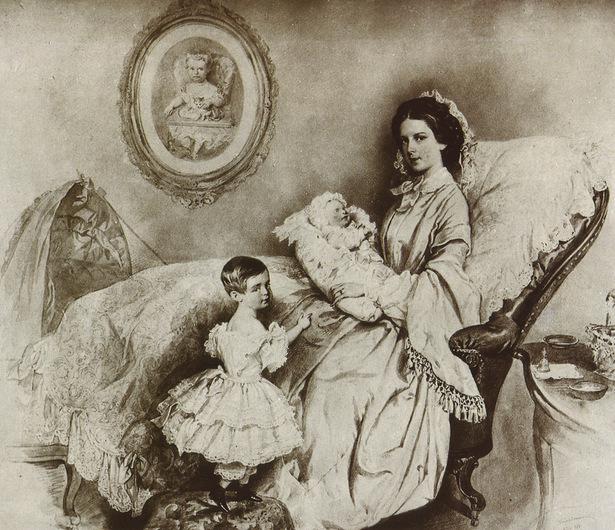
Travel
Virtually devoid of children and realize the futility of Elizabeth in 1860, decided to temporarily leave. She wanted a way to recover the lost freedom. It was announced that the Empress is seriously ill and in need of the sun and sea air. Franz Joseph offered her several seaside resorts of the Adriatic, belonged to Austria-Hungary, but primarily Sisi wanted to leave the country in general and for a time to hide in some remote area. Her choice fell on Madeira. Elizabeth went on for four months - from Corfu to England with arrival in France, where everyone was surprised flowering overlooking allegedly seriously ill empress. This was the beginning of her incessant wandering and desperate search for happiness. Since 1865, in Vienna, Elizabeth spent no more than two months of the year. It periodically (usually in the winter - on his birthday, Christmas, the first Viennese Ball) returned to the capital of Austria-Hungary, to see her husband and children, and each time her presence softened the strict etiquette of life of the Habsburgs. But soon Sisi again began to feel a prisoner and was leaving.
Constantly traveling, Elizabeth sent gifts to your children, but I saw them infrequently - only during their short comings. Gisela life was much more pleasant than the life of Rudolf, is strictly brought up, preparing for a career emperor. Elizabeth only watched from afar education heir, unable to intervene. Only once she was able to fire a mentor who, in the opinion of Sisi, used brutal methods of education, but even then it does not become closer to Rudolph. The boy suffered from the fact that he could not often see her mother. Even more lonely he felt after the birth in 1868 of Maria Valeria, which became a favorite of Sisi. At this time, the Empress herself bringing up her daughter, which gave clear preference to the other children, and the court Valery called the "only" child. Girl gets all travel companion mother. Inexperienced "young mother" worries because every trifle and even light rhinitis is the reason for the resignation of a regular babysitter.
Born in Budapest, Maria Valeria almost all of his childhood spent in Hungary. She was dressed in Hungarian style and even speak German with her father, she was forced into secrecy. But, unlike his mother, Maria Valeria love Hungary and could not. The only person at the court, who shared attitude to Elizabeth of Hungary, was Rudolf.
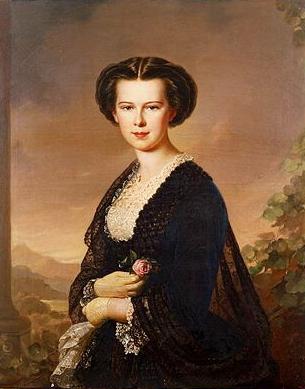
The death of Rudolf
January 30, 1889 Crown Prince Rudolf committed suicide. Stunned by the news of Elizabeth refused to believe in the death of his only son, and did not even attend his funeral, but on February 9 still decided to go down in the crypt of the Capuchin body Rudolf and saw what happened irreparable. Until the end of his life, Elizabeth was not able to recover from this blow and vinyl throughout his Bavarian inheritance, which became, as it seemed to cause mental imbalance son. After the death of his son Sisi even more turned in on itself and stopped wearing light colored clothing.
Subsequent year Sisi spent in Austria, dressed in all black and without removing the veil of mourning. She leads an indoor lifestyle and trying not to appear in public. Not finding calm, the Empress again resorted to his old drug - embarks on a journey. Moving from country to country, it is a long walk alone in deserted fields and mountains.
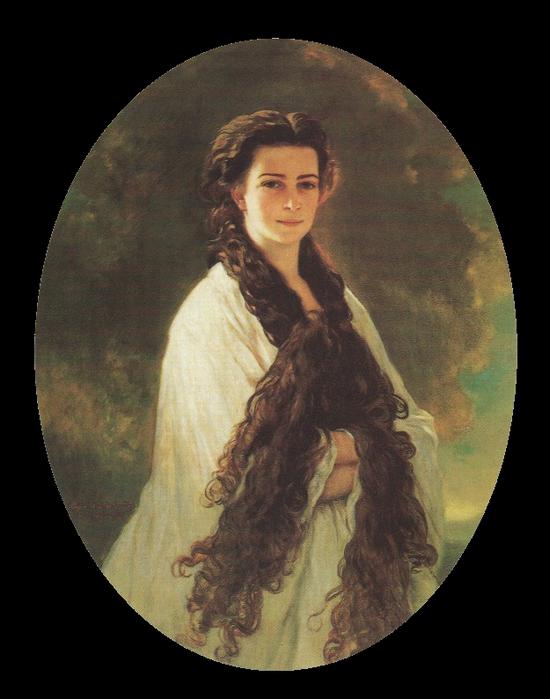
Murder Elizabeth
About Elizabeth terrorists always worry no more than about the bad weather, and forbade himself to accompany than the despair of their ladies and police. Fate in the face of an anarchist Luigi Lykken waylaid her in the morning on Saturday September 10, 1898, when Sisi accompanied by one of her ladies in waiting, the Countess Irma ball was on the waterfront in Geneva. Blow sharpening (pointy trihedral file) anarchist knocked her to the ground, leaving a tiny puncture wound in the heart. But Elizabeth did not feel the wounds and did not understand the true meaning of what happened. Deciding that the attacker simply wanted to snatch her jewelry, she got up and tried to continue the walk. Only a few minutes later she felt a sharp weakness, fell to the ground and lost consciousness. Fulfilled her desire expressed after the death of his son: "I, too, would die from a small wound in the heart, through which my soul will fly, but I want it to happen away from those I love».

Policy. Elizabeth and Hungary
Throughout the period of stay Empress Elizabeth almost did not interfere in politics. The only exception is the case where she was able to play a role in resolving the conflict between Austria and Hungary in the 60s of the XIX century.
At the court in Vienna Elizabeth disliked, and Hungary is interested in at least due to the fact that relate to this country with interest was just not accepted, as well as to the most Elizabeth. Empress studied the history of Hungary and the Hungarian language, happy to read Hungarian literature.
During a visit to Hungary, the young people of the imperial couple were delighted with the beauty of Elizabeth. High (Sisi was several inches taller than a spouse), slender, with a classically regular features, huge eyes shining and shimmering gold luxurious brown hair, Elizabeth leaves no one indifferent, and imbued with the response of sympathy. Later Elizabeth surrounded herself with ladies of the court of the Hungarian nobility. It liaises with the leaders of the Hungarian opposition, in particular, with its leaders - Deak Square and Gyula Andrassy, who tried through the Empress influence of Franz Joseph, hoping that he will go to meet their requirements. Efforts Elizabeth had a definite value to change the position of Franz Joseph in the Hungarian question. As a result, the emperor agreed to a private meeting with Deak and Andrassy, the results of which in 1867 signed an agreement under which the Empire was transformed into a dualistic Austro-Hungarian monarchy, constitutional rule was introduced, and Hungary received more freedom to solve their internal problems. May 8, 1867 Franz Joseph and Elizabeth were crowned in Budapest as King and Queen of Hungary. As a sign of his devotion to Hungary gave Elizabeth and Franz Joseph magnificent palace Godollo thirty kilometers from Budapest. There is reason to believe that Elizabeth Castle liked before, but weakened by the war treasury Austria could not overpower such a purchase as a gift to Empress castle.
